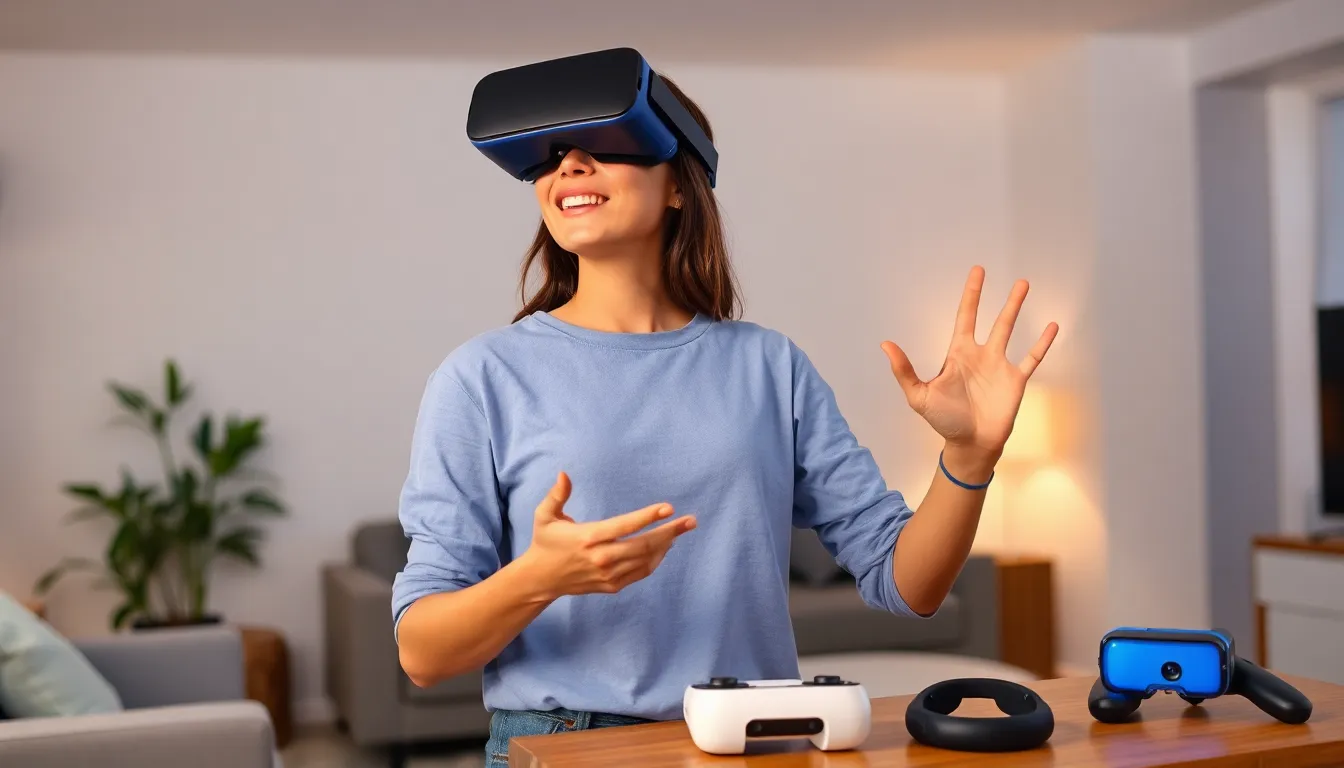Modern technology isn’t just a buzzword; it’s the magic wand that’s transformed everyday life into a sci-fi movie. From smartphones that fit in your pocket to smart homes that know when you’re cold, technology has taken leaps that would make even the Jetsons jealous. It’s not just about convenience; it’s about innovation that makes life easier, faster, and a tad more entertaining.
Table of Contents
ToggleOverview of Modern Technology
Modern technology transforms daily experiences, enabling seamless interactions and connectivity. Smartphones represent a crucial development, allowing users to access information instantly and communicate effortlessly. Smart home devices simplify tasks, from adjusting lighting to monitoring security, significantly enhancing convenience.
Artificial intelligence improves decision-making processes in various sectors, including healthcare and finance. These AI systems analyze data patterns to provide insights and automate routine tasks. Additionally, wearable technology such as fitness trackers promotes health awareness by monitoring activities and providing feedback on user performance.
The Internet of Things (IoT) connects everyday devices, creating an ecosystem where appliances communicate and operate together. Smart thermostats optimize energy usage by learning user preferences, leading to cost savings. Drones serve diverse purposes, ranging from aerial photography to agricultural monitoring, revolutionizing industries with innovative solutions.
Mobile applications cater to specific needs, fostering productivity and entertainment. Users can explore a myriad of options, from project management software to gaming apps, enhancing lifestyle choices. Cloud computing enables secure data storage and retrieval, supporting remote work and collaboration across global teams.
In education, technology facilitates online learning, giving students access to a wealth of resources from any location. Virtual classrooms create interactive environments, engaging learners with dynamic content. Advances in virtual reality improve user experiences in entertainment and training by simulating real-world situations.
Each of these technologies plays a role in shaping contemporary life, making tasks more efficient and enjoyable. As innovation continues, new solutions emerge, further altering how individuals interact with the world.
Communication Technologies
Modern communication technologies revolutionize interactions. They facilitate instant connectivity across the globe.
Smartphones
Smartphones serve as multifunctional devices that enable voice calls, messaging, and internet browsing. Enhanced features like high-resolution cameras and mobile applications further enrich user experiences. Users access social media, stream videos, and manage daily tasks through various apps. Data from the Pew Research Center indicates that 97% of Americans own a smartphone, demonstrating their prevalence. With diverse models available, consumers can choose devices that fit their needs and budgets. Thus, smartphones exemplify essential communication tools that connect people seamlessly.
Social Media Platforms
Social media platforms transform how individuals connect and share information. They allow users to post updates, photos, and videos in real-time. Popular networks such as Facebook, Twitter, and Instagram boast billions of active users globally. According to Statista, as of January 2023, Facebook has over 2.9 billion monthly active users. Engagement rates remain high, with individuals accessing these platforms multiple times daily. Brands leverage these platforms for marketing, enhancing customer interaction and feedback. Consequently, social media platforms play a crucial role in modern communication.
Transportation Innovations
Transportation innovations demonstrate the rapid evolution of mobility solutions driven by modern technology. Electric vehicles and drones play significant roles in shaping the future of transportation.
Electric Vehicles
Electric vehicles represent a shift from traditional gasoline-powered cars to sustainable alternatives. They reduce greenhouse gas emissions by utilizing electricity as a power source. With an increase of 43% in global electric vehicle sales in 2020, the demand continues to rise. Automakers are investing heavily in developing long-range battery technologies, which enhance driving range and reduce charging time. Furthermore, governments worldwide incentivize electric vehicle adoption through tax credits and rebates. Cities also expand charging infrastructure, making electric vehicles more accessible for everyday use.
Drones
Drones are revolutionizing various industries, including transportation and logistics. These unmanned aerial vehicles provide new solutions for delivering goods rapidly and efficiently. Retailers like Amazon test drone delivery systems that aim to reduce delivery times to under 30 minutes. Additionally, drones assist in aerial surveying, mapping, and agricultural monitoring. Their applications continue to expand, as regulatory bodies develop frameworks for safe operations in urban environments. By leveraging artificial intelligence and advanced sensors, drones improve accuracy and enhance delivery capabilities.
Healthcare Advancements
Modern technology dramatically transforms healthcare, enhancing patient care and improving outcomes. Innovations such as telemedicine and wearable health devices lead this change.
Telemedicine
Telemedicine offers convenient healthcare access, allowing patients to consult with healthcare professionals remotely. Video consultations eliminate travel time, saving patients hours. In 2020, around 46% of adults in the U.S. utilized telehealth services, highlighting its growing acceptance. This technology facilitates timely medical advice, especially for those in rural areas. Chronic condition management benefits significantly from these virtual check-ups, enabling consistent monitoring and proactive care. Patients experience greater flexibility, as they can schedule appointments at their convenience. Furthermore, telemedicine reduces the burden on healthcare facilities, enhancing overall efficiency.
Wearable Health Devices
Wearable health devices, such as smartwatches and fitness trackers, promote proactive health management. These devices track vital signs, physical activity, and sleep patterns, providing users with valuable insights into their health. Reports indicate that the global wearable health tech market is projected to reach $60 billion by 2023. Individuals gain awareness of their health, motivating them to adopt healthier lifestyles. Integration with mobile apps facilitates real-time data sharing with healthcare providers, fostering informed decision-making. Users can receive alerts for irregular heart rates, enhancing preventive care. Wearables thus revolutionize personal health monitoring, empowering individuals to take charge of their well-being.
Home Automation
Home automation significantly enhances convenience and security in daily life. Smart technology allows users to control various household devices remotely.
Smart Homes
Smart homes combine comfort with efficiency, leveraging devices like smart thermostats, security cameras, and lighting systems. These devices can be programmed to operate based on user preferences, optimizing energy use. For instance, smart thermostats learn heating patterns, reducing energy consumption by up to 10-12%. Security systems offer real-time monitoring and alerts, enhancing home safety. Using voice control, users can manage devices effortlessly, creating a seamless experience throughout the home.
Internet of Things (IoT)
The Internet of Things (IoT) connects devices, enabling them to share data and communicate for coordinated operation. Smart fridges can track inventory and suggest meals, while smart speakers can provide music and news updates. Data from IoT devices can enhance decision-making. For example, sensors in smart homes may adjust lighting based on occupancy, contributing to energy savings. Statistics show that the global IoT market is projected to reach $1.1 trillion by 2026, reflecting its growing relevance in day-to-day life.
Modern technology profoundly reshapes daily life in ways that were once unimaginable. From smartphones to smart homes each innovation enhances convenience and connectivity. The integration of artificial intelligence and IoT creates a seamless ecosystem that makes tasks simpler and more efficient.
As technology continues to evolve it will undoubtedly bring forth new solutions that further transform interactions and experiences. Embracing these advancements not only improves quality of life but also empowers individuals to make informed decisions in various aspects of their lives. The future promises even more exciting developments that will redefine how society engages with the world around them.




